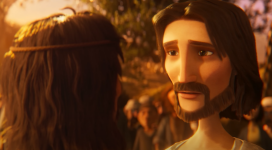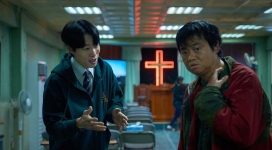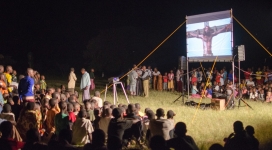
Christians living in Niger, West Africa have offered Christ-like forgiveness to the radical Muslims who destroyed their homes and churches, are are continuing to share the Gospel in the region.
On January 17, hundreds of Muslims, angered by the cartoons of the prophet Muhammad published by the French magazine Charlie Hebdo, destroyed 69 churches and 11 Christian homes. Ten Christians lost their lives and hundreds more were injured in the wake of the deadly rampage.
"They took pews, Bibles, chairs and sound equipment then set them on fire," said Pastor Musa Issa, whose church, Bethel Horizon, was among those destroyed, according to CBN's George Thomas. "They did this while chanting, 'Allahu Akbar!' I felt so sad. I started to cry."
He added, "I feel horrible...I ask myself 'Why'? Why did they do this to us? What did we do to deserve this?'"
Now, three months later, Christians living in the region are working to rebuild their community, determined to still preach the Gospel despite the dangers.
"My prayer is that they would come to know Jesus and that the Lord would touch them even in a dream," Ruth, Pastor Issa's wife, told CBN. "I want God to do to them what He did to Paul the Apostle when he persecuted Christians. God touched him on his way to Damascus. I want those men to experience the same touch from God!"
Pastor Issa explained that instead of reacting in anger, he now spends time developing closer friendships with several of his Muslim neighbors, who helped protect him when the mobs approached.
"When the first and second wave of rioters came, some of my Muslim neighbors stood in front of the church. But as more rioters attacked with deadlier weapons, it became too dangerous - so I told them to let them in," Issa said.
Pastor Zakaria Jadi, whose church and home were also destroyed, explained that while he forgives the perpetrators, widespread claims by Muslim leaders that the attack had nothing to with Islam are ridiculous.
"The mob kept chanting over and over in Arabic 'God is great!' God is great' as they robbed and burned my home. I've lived with Muslims all my life. I know a Muslim when he stands in front of me!" Jadi said.
In addition to targeting churches and homes, the Muslim mobs targeted Christian schools, ransacking each classroom, and writing the message on each blackboard: "There is no God but God and the Prophet Mohammed is his messenger."
"I think this message on the blackboard they are trying to tell us (Christians) that we really don't belong here. This is a Muslim area and they want to keep it pure for them. They don't want any Christians here," said one of the school's teachers, David Bye.
Sadly, the Christians' repeated pleas for justice from Niger's government have gone unheard, and police have refused to arrest anyone in connection with the attacks.
"I tell our brothers and sisters that we don't wrestle against flesh and blood but against principalities," said Boureima Kimso, head of the Alliance of the Evangelical Churches in Niger. "We have to encourage ourselves because persecution is part of the life of the Church. There is no church that existed without persecution."
But despite the government's lack of concern and pervasive danger in the region, the Pastor said he finds encouragement in the belief that God is preparing Christians in Niger for great times of revival.
"The Lord is training us; He's building us. There cannot be increase without hardships. If you want to go to the next level you have to go through hardship," Jadi said.
The full interview can be read at CBN News by clicking here.







